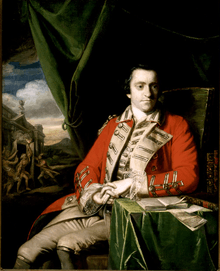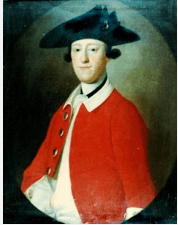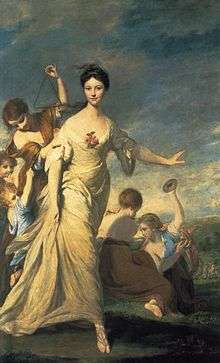John Hale (British Army officer)
General John Hale (1728–1806) was a British army officer, who is remembered chiefly for his close friendship with General James Wolfe, and for his exceptionally large number of children by his wife Mary Chaloner, a noted beauty who was painted by Joshua Reynolds.


Career
As a very young officer he played a part in suppressing the 1745 Rebellion, an experience which is said to have given him a lifelong aversion to the Scottish nation.[1] He was stationed at Fort Edward and later took part in the Siege of Louisbourg as the commander of the 47th Regiment of Foot. He also commanded the regiment in the Battle of the Plains of Abraham.[2] He was a close friend of General James Wolfe, and it was Hale whom the dying Wolfe ordered to carry his final dispatches back to England.[3] Hale received a grant of Crown lands in Canada, where several of his sons later settled.[1]
John Hale co-owned the privateer Musketo, 120 tons, eighty men, and the Hertford. These vessels sailed on their first cruise in November 1756.[4] The regiment was renumbered the 17th Lancers in 1761. That year they were stationed in Scotland, where Hale's proverbial dislike of Scots people caused him to become engaged in a serious fracas with a toll-keeper, which might have had ended fatally. He was not disgraced, but was personally reprimanded for his conduct by King George III.[1] The following year he acted as secretary to Earl of Albemarle during the Battle of Havana.[5] After 1762 he gradually withdrew from regimental affairs, due it seems to quarrels with some of his fellow officers.[1] In politics he was something of a reformer, and during the Yorkshire by-election of 1785 he made a celebrated speech which was considered by most of the electorate to be dangerously radical.[6]
Hale was promoted major-general in 1772,[7] lieutenant-general in 1777[8] and general in 1793.[9] He was appointed Governor of Londonderry in 1776, holding that office until his death in 1806.[1]
Family
He was born in London in 1728, the youngest son of the eminent judge Bernard Hale, former Chief Baron of the Irish Exchequer and his wife Anne Thoresby;[10] his father died a few months after he was born. General Bernard Hale was his elder brother. The Hale family came originally from King's Walden in Hertfordshire, and were prominent in local politics for generations.

John married in 1763 Mary Chaloner, daughter of William Chaloner III of Guisborough and his wife Mary Finny; she died in 1803. They had twenty-one children, ten sons and eleven daughters. Of their children William, John, Richard, George, Francis, Henry, Bernard, Vicesimus, Edward, Emily, Elizabeth, Mary, Anne, Fanny, Catherine, Charlotte, Octavia, Jane and Harriet survived infancy and seventeen of the twenty-one outlived their father.[1] Hale bought a farm near Guisborough which he renamed Plantation House, and where the family grew up,[11]
His daughter Harriet married Lawrence Dundas, 1st Earl of Zetland.[12] Her sister Anne married Henry Walker Yeoman, and Mary married Thomas Lewin. Of his sons, John junior had a distinguished political career in Canada. Richard became Vicar of Harewood, a living which was in the gift of his uncle Lord Harewood,[13] and Vicesimus was a judge in India. Francis and Edward were clothiers. None of the General's sons held high military office.[1]
Hale was not a rich man, and there is good reason to believe that he had some difficulty in providing for so large a family. Although his wife was the sister of a Countess, her own will shows that some of the younger sons were badly provided for.[14]
There is a celebrated portrait of Mary Chaloner Hale as Euphrosyne, one of the three Graces, by Sir Joshua Reynolds, who also painted her husband. It now hangs in Harewood House, the home of her sister Anne, who married Edward Lascelles, 1st Earl of Harewood.
References
- Ffrench Blake, R.L.V. The 17th/21st Lancers 1759–1793 Leo Cooper 1968 p. 7
- Library and Archives Canada
- Helscher, Joost Death's Head 2013 Editions Chamerelle p.12
- Notes on Nova Scotian Privateers
- Pointon, Marcia Strategies for Showing: Women, Possession and Representation in English Visual Culture Oxford University Press 1997 p. 181
- The speech of Lieutenant-General Hale in favour of the people at the nomination and election of a member of Parliament for Yorkshire' Printed at York 1785'
- "No. 11251". The London Gazette. 23–26 May 1772. p. 2.
- "No. 11802". The London Gazette. 2–6 September 1777. p. 2.
- "No. 13582". The London Gazette. 15–19 October 1793. p. 913.
- Ball, F. Elrington The Judges in Ireland 1221–1921 John Murray London 1926
- Pointon p.187
- Debrett Complete Peerage
- Pointon p.183
- Pointon p.181
| Military offices | ||
|---|---|---|
| Preceded by Regiment raised |
Colonel of the 17th Light Dragoons 1763–1770 |
Succeeded by George Preston |
| Preceded by The Duke of Argyll |
Governor of Limerick 1770–1775 |
Succeeded by Sir Henry Clinton |
| Preceded by Sir John Irwin |
Governor of Londonderry 1776–1806 |
Succeeded by The Lord Hutchinson |